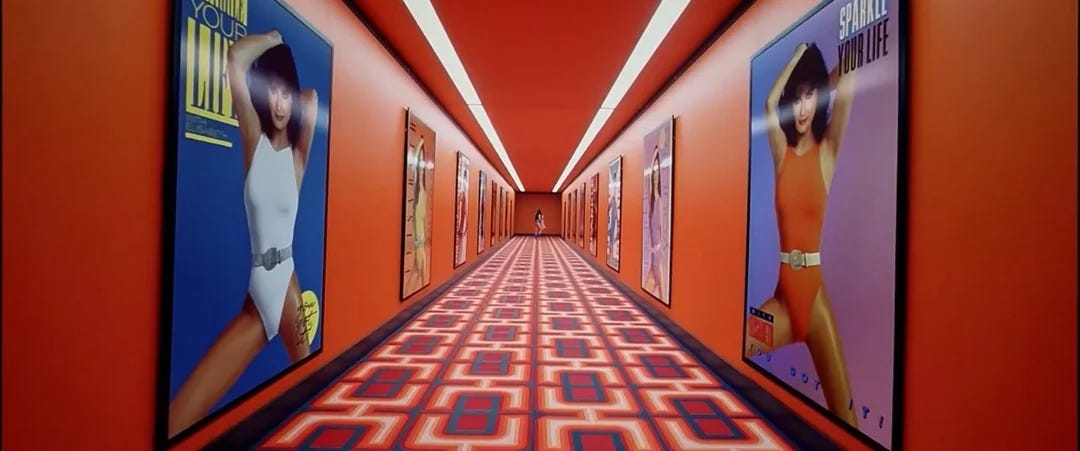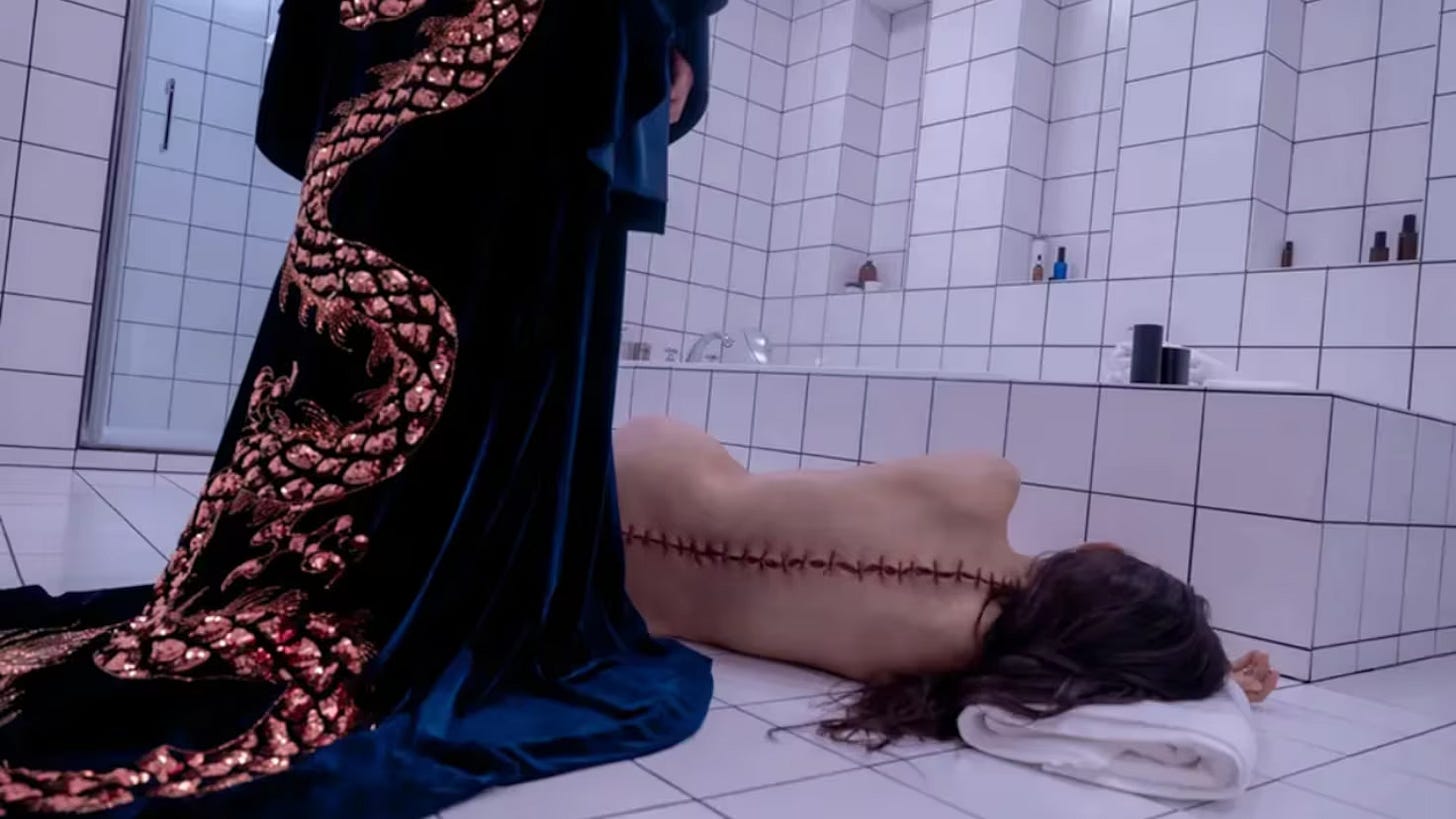The Substance is Not a Feminist Satire
The hot-button indie body horror film is spectacle without (the) substance.
This essay is a hard departure from my usual work; I write about television, specifically shows I love. But after watching the hot-button indie horror The Substance, I have so many thoughts that I have to weigh in.
Marketed as an opulent and gory satire of Hollywood’s beauty standards, The Substance is first and foremost a body horror. Starring Demi Moore and Margaret Qualley, a middle-aged and recently sidelined Hollywood starlet takes an injectable drug that splits her in two, creating a younger, “better” version of herself. What ensues is The Picture of Dorian Gray on ayahuasca. The younger alter-ego, Sue, drains the lifeforce from the older Elisabeth, abusing The Substance to the point where her body literally falls apart. But it doesn’t end there, as the final half-hour is an over-the-top gore fest with a deformed female figure literally described as a “monster.” What began as a caricature of the fear of aging suddenly wades into uncomfortable ableist cliché. Though maybe that’s part of the commentary, too? Hard to say. The film ends in a disgusting spectacle, as if to really punctuate its own hyperbole. I came in ready for the weird, but ultimately, I was let down.
Let me start by saying there are parts that I liked. Moore and Qualley both gave excellent performances, meeting the heightened concept with full commitment. I think the strongest element of the film, by far, was the production design. The vibrant colors, striking symmetry, and Hollywood camp create a hyperreality that serve the vision well. The grandiose objectification of the female body fits in with the absurdism, communicating to the audience immediately that we are through the rabbit hole. I personally did not find myself bogged down by illogic or plotholes, though there were many to be found. (Why would Elisabeth continue the experiment if the two didn’t share consciousness and memory?) The insane premise is to be taken at face value, lest the whole project slip into a more serious genre. And this world isn’t meant to be serious. It’s meant to be Nightmareland.
Ultimately, I would put The Substance in the same category as Saltburn – good thriller, bad satire. But the difference is that I actually enjoyed watching Saltburn. Perhaps horror buffs who find gore “fun” would disagree, but the exciting parts of the premise were so sapped of joy by the end that all I was left with was disgust. And disgust without commentary isn’t enough for me.
An easy criticism is that the body horror elements are just too gross. I have what I’d describe as a medium-high tolerance for gore. I enjoy horror films, but I’m not a die-hard and know my limits. This threshold is subjective of course, and different people have different tolerance levels. But I can appreciate a film that exceeds my gore tolerance if the story is good enough. For example, The Thing is very gory, and the violence makes me uncomfortable. There are strong themes of body horror, and those 80s practical effects just hit different. But the storytelling in The Thing is so strong that I gladly go along for the ride. The themes of distrust and paranoia make for gripping drama, independent of the sci-fi thriller aspect. The Thing is one of my favorite horror movies ever, even if I have to cover my eyes at times. I can’t say the same of The Substance.
The writing and execution were also chronically handhold-y. And I can go along with a fair amount of handholding; I liked Barbie, after all. Although I personally don’t need themes spelled out for me, I understand that with big abstract concepts, we want to take as many people along for the ride as possible. When we step into the theoretical, some viewers need more guidance. The problem is that The Substance is not only handholding the themes of body dysmorphia and self-harm, but it’s also handholding with basic plot points. On multiple occasions, there are clunky flashbacks reminding the audience of a moment or character. When Elisabeth digs out the phone number from a high school acquaintance that she met earlier, and when she opens a wrapped gift from her sleazy producer, both moments are punctuated with a flashback as if to say, remember this guy? Its distracting, and condescending. I have to wonder if these were shoehorned in from a studio note, and overplayed on purpose as part of the camp. If that’s the case, I want to shake a film executive and scream “The Substance is not a second-screen film! Not even close! Please take your audience seriously!!”
My biggest grievance with The Substance is that it ultimately lacked any sort of critique or perspective on the subject it’s meant to satirize. Namely, unattainable female beauty standards set by Hollywood, and the self-inflicted violence that it inspires. The concept of The Substance seemed to promise a no-holds-barred commentary, one that’s dark and searing, perhaps cutting straight to one of those ugly truths of the modern condition. What it delivered instead is an inflated version of self-optimization, created for shock without the awe. The central message seems to be, “Shit’s fucked up, innit?” Some claim this is meant to be an outrageous B-movie, and doesn’t owe its audience a thoughtful critique. But with self-harm being a subject matter that’s so salient and deeply personal to women, it seems disingenuous to mine the misogynistic violence for spectacle without having anything to say.
One aspect that stood out to me immediately is that, for a film that’s ostensibly flirting with feminist themes, The Substance doesn’t pass The Bechdel Test. No women speak to each other for the entire duration of the film, save for a faceless “Happy birthday!” from a passerby. Even in the third-act confrontation between Elisabeth and Sue, not a single word is exchanged. At first, I assumed this must be intentional. Perhaps it’s meant to be a representation of Elisabeth’s internalized misogyny? Or if this is a hyperreal feminine nightmare, perhaps it’s meant to contribute to her isolation?
Now, I’m not so sure. Because none of the background women seem to have inner lives. The housekeeper vacuums Elisabeth’s home in silence, out of focus. Her backup dancers have no personalities, no aspirations of their own, not even jealousy of the spotlight. There are no women in the café, or on the street, and they certainly never appear in public groups. Even the one female assistant, who has one miserable line, only exists to be the punchline of a joke. There’s no sense of community or life existing outside of Elisabeth’s orbit, something she doesn’t notice due to her wealth, privilege, and/or need to please the male gaze. There’s no alternative, even in the margins, to her hellish existence of self-absorption. The world of The Substance is not just a fatalistic view of gendered power dynamics. It seems to forget that women exist when they’re not being looked at.
In order for me to consider a film a feminist enterprise, there needs to be more than just a gross caricature of misogyny. Feminist perspective is grounded in community, and even a lonely protagonist should feel and acknowledge its absence. Instead, The Substance is a spectacle of rugged individualism, a solipsistic ouroboros. A risk-taking horror film? Absolutely. But let’s all get one thing straight: The Substance is not a feminist satire.










I finally watched The Substance, so now I can respond to this. :) I agree with a lot of what you've said, especially the part about ableism. I enjoyed watching (most) of the movie, mostly because I loved the absurd surrealism of the premise (and the acting was great), but I was struck by this idea that the conclusion seemed to say that it was Elisabeth/Sue who was at fault, not the entire industry/patriarchal beauty standards/misogyny/etc., if that makes sense.
Also, I spent most of the movie wondering, why are you not leaving notes for each other?? Or communicating at all?
I appreciate your essay here, and there’s a lot I agree with. I was not a huge fan of The Substance — it is far from a perfect film, and I don’t think it is a completely successful satire; there are certainly choices in the film that undercut its potential in that regard. As you write, it’s clunky, repetitive, and seemingly vacuous at times.
But I do believe one aspect of the film that you point out—that it “seems to forget that women exist when they’re not being looked at”—is one thing that, in my opinion, contributes to the film’s success as a critique of the social expectations of women as objects. The film (and we) can’t stop looking at these women, their bodies. The camera refuses to let us. It shows us every angle, every crevice, all the viscera — multiple times over. Its unsubtlety is nauseating. So why can’t we look away? I don’t think it’s as simple as Fargeat is simply doing to these women what she claims to satirize in a feedback loop.
Sue’s/Elisabeth’s isolation from other women, lack of internal character, and the eventual nightmarish consequences they endure all serve to highlight how siloed off a woman becomes when she is viewed only as an object. In its spectacle, The Substance implicates the audience in contributing to the structures it critiques. We watch the carnival grotesquerie and laugh, or cringe, or avert our eyes — when our watching, and the pressure of our scrutinizing gaze, is what made the women into those monsters.
In a comment you pointed out that “The spectacle of violence against a body doesn’t in itself subvert the system that enables the violence,” which is another great point. I don’t think that what Fargeat accomplishes (in what I wrote above) is her subverting the system. At best, she’s calling our attention to the system and creating an interesting dynamic with the audience, which is not quite enough to be considered satire, but I do still think it’s a commentary worth unpacking.